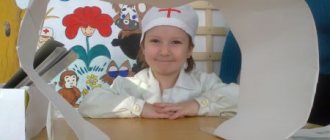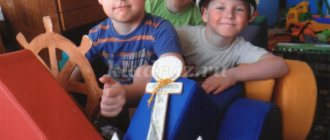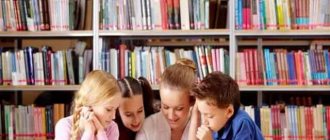Summary of the role-playing game "Family".
Summary of the role-playing game "Family".
The plot of “Visiting the girl Zalina.”
Target:
formation of children's social experience through play activities.
Educational objectives:
- to teach children to distribute roles and act according to the role they have assumed, to develop the plot;
- perform appropriate play actions, find objects necessary for play in the environment, lead children to independently create play ideas;
— enrich vocabulary (cash register, receipts, confectionery); develop children's dialogical speech; — enrich children’s social and gaming experience (teach correct relationships in play).
Developmental tasks:
—
develop interest in the game;
—
learn to unite into groups in the game;
— introduce children to the rules of behavior in the store.
Educational tasks:
- cultivate respect for the work of adults; promote the establishment of friendly relationships between players.
Game material:
“Family” - attributes for room equipment; dishes; furniture; bag; wallet; money; substitute items. “Store” - seller’s clothes; cash register; vegetables, fruits, sweets, etc. "Driver" - steering wheel; tickets.
Preliminary work:
- a conversation about the hometown, about the republic in which the children live;
- examination of national clothing; dishes; - looking at pictures about the family; - reading poems about mom, lullabies, talking about mom; — board game “Family”; - conversations about people’s professions; — didactic game “Who works where? "; — production of attributes for the game; — conversations about the culture of behavior in public places; — role-playing games with children “Family”, “Shop”.
Contents of organized children's activities
I.
Organizational moment:
- Guys, I want to inform you that they brought me a very beautiful dress today. But this is the women's national costume of Kabardians. Children look at the costume. What Kabardian female names do you know? Children call.
Do you know that today the girl Zalina invited us to visit. Maybe we can all go visit her together.
II. Basic course of the game:
Educator:
Who wants to try on a suit.
Anya, I suggest you be a mother, and Camilla a daughter, and we will have Timur as a dad. You will be our Kabardian family, and we will go to visit you. But we still need another family. Children choose mom, dad, daughter and son. Well done, the roles have been distributed. Now, we need to decide how and what we will use to get there? The children suggest going by bus. Educator:
Okay, let's go by bus. But then we need another driver. Children choose a driver. I suggest stopping at a store along the way to buy gifts for friends. So we need a seller. I suggest that Zalina’s family go and prepare to welcome guests. The driver is preparing the bus. And another family is going to visit. The girls are dressing up. Dad reads the newspaper. My son is playing with a car.
Before leaving the house, mother reminds children of the rules of behavior. They go on a visit, or rather, first go to the bus stop. Mother:
We carefully board the bus.
Driver:
Careful, the doors are closing, next stop: “Magnit”.
Driver:
Careful, the doors are opening, Magnit stop.
Mom:
We get off the bus carefully, without jostling, we help each other.
We got off the makeshift bus. Dad suggests going to the store and buying gifts for Zalina. Mom:
Children, hold hands, let's go to the store, but there is a roadway ahead.
What do we need to do in order to cross the road? Children:
First, you need to look in one direction to see if there are any cars, then in the other, and only after that we cross the road.
Mom:
Well done, right.
We go to the store. The children greeted the seller. - Hello. We need gifts for friends. Seller:
Hello, please choose.
Children and parents choose a box of Choco Pie, a pack of tea and a box of Raffaello. They approach the cash register. Mom turns to the seller: Please count how much we owe you. Seller:
Thank you for your purchase, 250 rubles from you. Mom pays the seller and they leave the store.
They cross the road to the stop. They get on the bus again.
Driver:
Be careful, the doors are closing, next stop: “Friendship.”
Driver:
Be careful, the doors are opening, the Druzhba stop.
They approach the house. The doorbell rings. Dad opens the door. - Hello, my dears, come in. Dad and dad shake hands. Everyone enters the house and is greeted by their mother. Everyone greets and greets each other.
Zalina's mom:
Come on in, come on in.
You are probably tired from the road. Have a seat. I’ll put the kettle on now (mom, supposedly, put the kettle on). Coming back. Well, tell me how you are doing, how are you doing at school, in kindergarten? Children:
please take the gifts we brought for tea.
Zalina's mom:
Thank you very much.
I baked our national dish, lakuma. Then they all drink tea together with delicacies and cakes. Moms:
The kids can go play games while we prepare lunch.
And dads will go to the grocery store. Here's a list of products. Mom:
Kids, what do you want for lunch?
Children:
I want pies;
and I want a sausage. Mom:
Okay. Children leave the table and start playing with toys. Dads go to the store. And the mothers begin to prepare dinner. Children independently come up with a further turn of events.
MAGAZINE Preschooler.RF
Snopko Elena Alexandrovna Educator of MADOOU TsRR D/s 30 Solikamsk, Perm regionThe goal is to introduce children to a version of the role-playing game “Family.” Objectives: 1. To develop role-playing communication skills. 2. Develop a culture of communication. 3. Consolidate knowledge about family traditions. 4. Cultivate a friendly and respectful attitude towards elders. Place – area for games “House” Time – from 15 minutes. Number of children – from 5 people. Materials – dishes, a fruit basket, boxes in gift wrapping, a smartly dressed doll, artificial flowers; material for creativity. Progress of the lesson.
1 part. Guys, look how beautifully dressed the Mashenka doll is. What do you think this is connected with? (It’s Masha’s holiday, her birthday). And how beautifully the table is set in the house, why? (she is waiting for guests) Shall we congratulate Masha? (Yes). But we need to become a family for Masha. Agree on who will take on what role (mom, dad, godmother, sister, brother, aunt, uncle, etc.) How do they congratulate you? (they give gifts, say warm and pleasant words). Mom, aunt and sister will stay to prepare the festive dinner and will call you when everything is ready, and you will think about the gift. Where can we get a gift? (we’ll make the postcard ourselves). Part 2. We make a card from different materials, at the discretion of the children. The teacher helps set the table, lay out the fruit beautifully, and decorate the room with posters and flowers. We ask everyone to sit at the festive table (seat the children, place a doll at the head of the table, turn on low music). Dear guests, on the occasion of our Mashenka’s birthday, we are treating you to tea. Try some fruit, would you like some tea? (the entire lunch process is led by the teacher) And now it’s time for congratulations! Masha, accept the gifts. Now you can dance. Thank you guys, it was very tasty and fun. Then invite the children to clear the table, wash the dishes, and put Masha to bed. Part 3. Guys, what holiday did we celebrate? (Masha’s birthday) What other holidays are celebrated at home? (New Year, Maslenitsa, Easter, Christmas). All of the holidays listed are family holidays. Why are they called that? (celebrated by a group of relatives - family) Which gifts are given on these holidays? (for Maslenitsa - pancakes, cooking; for Easter - eggs, for Christmas - souvenirs). What holiday is coming soon? (Easter) What gifts will you give to your loved ones? What gifts would you like to receive yourself? (children's answers). Guys, never forget to congratulate your relatives on the holidays, say more compliments on the birthday person, hug your grandparents more often, behave well-mannered and cultured on holidays, then your family holidays will be remembered for a long time.
| Next > |
Summary of a lesson in the middle group on the topic “Family Traditions”
Progress of the lesson
1. Psychological attitude.
Stand in a circle, children, I’m in a very good mood today and I want to convey it to you, let’s hold hands and smile at each other.
– Did you feel the warmth in your hands? This mood of mine was conveyed to you. 2. Motivational-oriented stage.
I draw the children’s attention to the house. There is a house in a clearing, Well, the path to the house is open. We are opening the gates. We invite you to this house! You will find out who lives in the house if you guess the riddle. 3. Search stage.
Didactic game “Guess the riddle.”
- Before going to bed, putting on pajamas, we ask to read... (mom) - Fragrant jam, pies for a treat, delicious pancakes at his beloved... (grandmother) - He did not work out of boredom, his hands are calloused, and now he is old and gray, my dear beloved... (grandfather) - Who will teach you how to hammer a nail, let you steer the car and tell you how to be strong, brave, dexterous and skillful? You guys all know, this is our favorite... (dad) - Who is the cheerful little one - crawling quickly on his belly? Amazing boy - this is my youngest... (brother) - Who likes to dress up so much? A very fashionable girl, my eldest... (sister). As they solve riddles, children find and display pictures - the answers. We find out that a large family lives in the house, and family members are called in one word - relatives. 4. Game exercise “Continue the sentence:
“I live with...”.
Children take turns naming their family members (relatives). 5. Game exercise “Who is older, who is younger?”
- Denis, who is older, you or dad?
- Eva, who is younger, mom or you? Etc. 6. Sedentary ball game “Say kindly.”
— Since ancient times, there has been a tradition that when a child is born, he is given a name.
So each of you has your own name. While you are little, what do they call you? And when you grow up, what will they call you? — In the family, everyone calls each other affectionately, tenderly, because they love them, but how can you affectionately call your son? (daughter, grandson, mother, grandfather, granddaughter, father, brother, etc.). The game is played with a ball, everyone must form a diminutive form. 7. Motor minute.
We go out into the yard as a friendly family.
Let's stand in a circle and do exercises together in order. Mom raises her hands, Dad cheerfully crouches. Turns left and right, made by my brother Seva. Well, I jog and shake my head. 8. Game exercise “Fourth odd”.
To clarify who is a family member, I propose to determine which of these people is the odd one out: - mother, neighbor, grandmother, sister - grandmother, friend, sister, mother - sister, grandmother, salesman, brother - grandfather, father, driver , son, janitor, dad, brother, grandfather.
9. Didactic game “Mother’s Daughters.”
- And now you will choose your role (mom, dad, grandmother, grandfather, brother, sister) using an emblem and an object (hammer, dishes, watering can, threads, fishing rod, rattle, doll, book, etc.).
Tell us what you will do in this role tonight. For example, I am a grandfather, I will read a book in the evening, I am a dad, I will go fishing in the evening, etc. 10. Reflective - evaluative stage.
- Guys, what did we talk about today?
(I offer mnemonic cards to help) - What did you like? - Well done, you tried very hard! Expected results:
enrichment and systematization of ideas about your family, awareness of yourself as a family member; expanding ideas about family traditions; emotional and cognitive inclusion of children in the process of individual and collective interaction with reality; demonstration of certain skills, relying on one’s knowledge and skills in a specific activity.
The meaning of story games
The development of a little person is impossible without a variety of games. At an early age, it is enough for the baby to take a rattle in his hands and shake it. Children grow up, they are attracted to new toys, and the rules of the game become more complex. The baby strives to involve those around him in the gameplay, first his mother, then other children. The creativity in the personality of a preschooler is manifested.
A plot appears in the gaming activity: the children begin to assign playing roles and agree on the rules. Thematic role-playing games of preschoolers in the older group are already becoming more specific on the topic: not just “play with dolls,” but depict a plot scene, for example, a tea party with guests, where each child has a specific role, or act out a scene of disobedience. The child creates an imaginary situation that allows him to try on any role and feel like the main character.
The preschooler is absolutely independent in his actions: he can cut off bread with an imaginary knife, or with a small stick, imagining it as a key, open the lock on the door. The kid imagines himself in the hospital, at school, in the store, acting out various situations. The child’s self-expression manifests itself especially clearly in story-based play situations.
Experts identify role-playing games as a separate creative type, which are characterized by the mandatory presence of a plot, distribution of roles, and are subject to certain game rules. Any game process with a plot and distributed roles is a gaming activity of a team. Several people are involved here.
Significant socialization occurs precisely in joint activities, when preschoolers interact with each other in accordance with accepted roles. The baby learns the norms of social and moral behavior, and develops communication skills. The fidget learns to show independence, find a way out of complicated situations, and engage in constructive communication during conflicts. The child gains experience of behavior in different situations.
Among the characteristic features of all role-playing games of older preschoolers, many experts attribute the duality of the nature of the game process, which manifests itself in the combination of the fictional, imaginary world of adults with the reality of the actions of preschoolers in the game. For example, a baby is sitting on a chair, and at the same time in game reality this child is a bus driver.
Game objects replace in the imaginary world objects that are inherent in the world of adults. The duality of the situation allows preschoolers to receive information and acquire knowledge about aspects of reality previously unknown to them. The kid cannot cure a sick person or pull out a tooth, but in the gameplay he learns what a doctor does, how to behave in a hospital, and that helping people is good.



